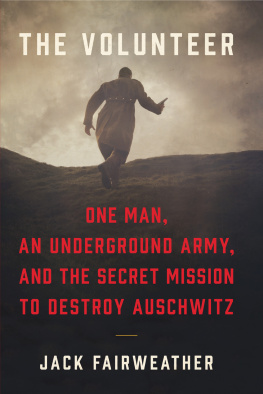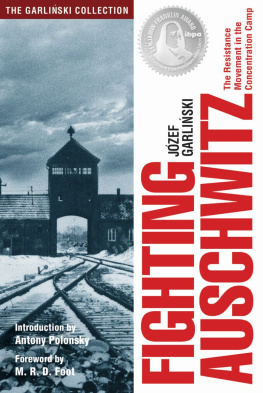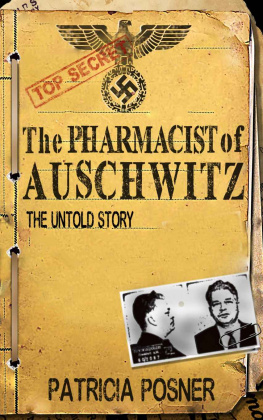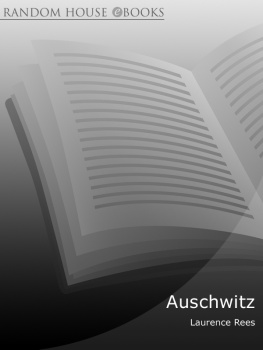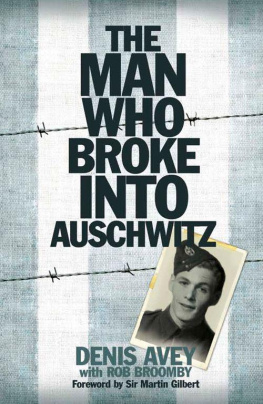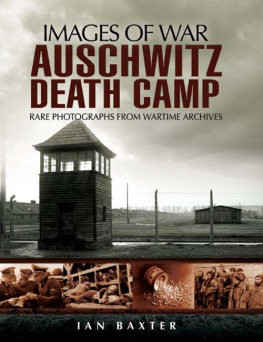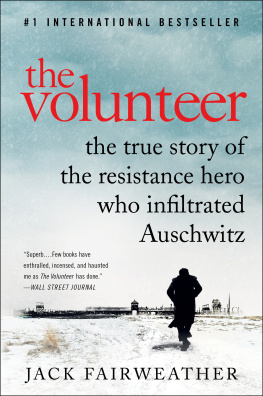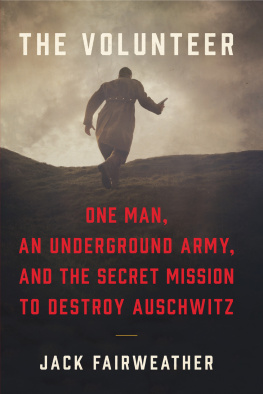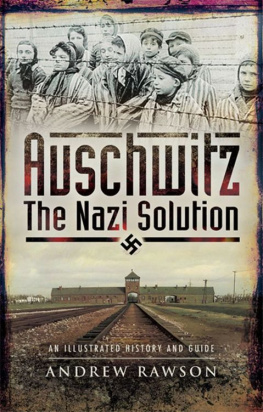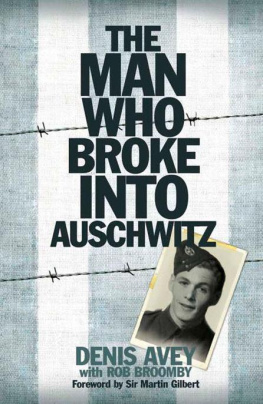Table of Contents
Landmarks
This book would not have been possible without my editor at Custom House, Geoff Shandler, whose support, keen advice, and patience have helped bring Witolds story to life. Liate Stehlik, my publisher, has shared my passion for Witolds story over the past three years and Im grateful to her and the HarperCollins team for the platform they have provided. Many thanks to Vedika Khanna, assistant editor, and Nyamekye Waliyaya, the head of production, and David Palmer, for turning the manuscript into a book. My U.K. editor at Ebury, Jamie Joseph, offered astute edits and encouragement. The book was first conceived of with the help of my wonderful agents Larry Weismann and Sascha Alper. I am grateful to Clare Alexander, my agent in the United Kingdom, for her support throughout my career. Jacob Levenson edited (and reedited) each draft of the manuscript, never gave up correcting my prose, and helped me discover Witolds humanity.
Marta Goljan led my research team and joined me in following Witolds footsteps from Krupa to the camp and beyond. She and Katarzyna Chiyska spent two years in Owicim tracking down and translating hundreds of prisoner accounts and memoirs. Along with Luiza Walczuk in Warsaw, they helped locate and interview dozens of camp survivors and their families, and in the process introduced me to the joys of Polish culture. Im especially grateful to Katarzyna for her amazing work pulling the book together in its final stages. Ingrid Pufahl was my wise and brilliant researcher in Washington, D.C., who invariably found answers to my many obscure requests. Many thanks also to the rest of the team: Hannah Wadle, Irina Radu, Alexandra Harrington, Karianne Hansen, Iga Bunalska of the Auschwitz Study Group, and Anna oziska and Paulina Winiewska and the staff of the Pilecki Institute. Filip Wojciechowski offered his insights and many fine runs through Warsaw.
I am hugely grateful to Piotr Cywiski and Andrzej Kacorzyk for opening the doors to my research at the Auschwitz-Birkenau State Museum. Piotr Setkiewicz at the research department fielded my endless queries with good humor, and offered his insights on each stage of the manuscript. Adam Cyra was my first guide to Witolds story and generously shared his own research and findings. Wojciech Posa and Szymon Kowalski ensured I never got lost in the archives. Thanks also to Jerzy Dbski, Jacek Lachendro, Agnieszka Sieradzka, Anna Walczyk, Agnieszka Kita, Sylwia Wysiska, Halina Zdziebko, Roman Zbrzeski. Mirosaw Obstarczyk helped me see the camp through Witolds eyes. Special thanks to Krystyna Boejewicz at the Polish Underground Study Trust in London for fielding many requests and Jarek Garliski for first encouraging me to write the book. On behalf of my research team Id also like to thank Klaudia Kieperka from The Polish Institute and Sikorski Museum in London, Ron Coleman, Megan Lewis and Rebecca Erbelding at the United States Holocaust Memorial Museum, Alla Kucherenko at Yad Vashem, Dovid Reidel of the Kleinman Holocaust Education Center, Jacek Syngarski of Archivo Polonicum, Freiburg, Fabrizio Bensi of the International Committee of the Red Cross, Geneva, Gerhard Keiper of the Political Archive, German Federal Foreign Office, Carina Schmidt and Peter Haberkorn at Hessian State Archive, and Johannes Beermann of the Fritz-Bauer Institute in Frankfurt.
Over the course of my research I have had the great privilege of getting to know Witolds family. Andrzej Pilecki and Zofia Pilecka-Optuowicz spent hours sharing with me memories of Witold. Their great warmth, generosity, and frankness gave me an early insight into their fathers character. Andrzej joined me on several stages of the research, most memorably overnight in Alwernias seventeenth-century Bernardine monastery, where Witold, Jan, and Edek had been well fed after their escape. When Andrzej couldnt be with us, he made sure we were properly taken care of. Marek Ostrowski has also become a dear friend and mentor. Special thanks also to Dorota Optuowicz-McQuaid, Beata Pilecka-Rycka for many fine cakes, Elbieta Ostrowska, Tomasz Ostrowski, Edward Radwaski, Lidia Parwa, Stanisaw Tumielewicz, and Krysztof Kosior. David McQuaid helped me piece together some of the gaps in Witolds story and understand his connections to our own time.
I was also honored to interview those who knew Witold or shared in the struggle of those times: Kazimierz Piechowski, Bohdan Walasek, Jerzy Zakrzewski, Jerzy Bogusz, Janusz Walendzik, Mieczysaw Gauszka, Zofia Zuaek, Jacek and Ryszard Stupka, Jzefa Handzlik, Anna Czernicka, Stefan Hahn, Mieczysaw Mastalerz, Kazimierz Albin, and Zofia Posmysz. I am indebted to the families of those connected to Witolds story for sharing their time, memories, and private papers: Maria and Szymon witorzecki, Marek and Barbara Popiel, Yaninka Salski, Jarosaw Abramow-Newerly, Daniel Piechowski, Jan Tereszczenko, Piotr Woyna-Orlewicz, Ewa Biay, Adam Wojtasiak, Zofia Winiewska, Maria Serafiska-Domaska, Stanisaw Domaski, Jan Dembinski, Jan Jekieek, Krystyna Klczar, Wiesaw Klczar, Kazimierz Klczar, Andrzej Molin, the Stupka family, the Kousznik family, Krystyna Rybak, Robert Potnicki, Jacek Dubois, Boena Sawiska, Henryk Bleja, the Harat family, Beata Ciesielska-Mrozewicz, Felicjan wierczyna, Piotr Wielopolski, the Mikusz family, Krzysztof Nahlik, Jan Chciuk-Celt, Stefan Pgowski, Tadeusz M. Puaski, Marta Orowska, Wanda Janta, Ryszard Stagenalski, and Stanisaw Mrz.
Thank you to the following for looking over various stages of the manuscript: Anthony Polonsky, Robert Jan van Pelt, Nikolaus Wachsmann, Dariusz Stola, David Engel, Bernard Wasserstein, Yehuda Bauer, Wojciech Kozowski, Hanna Radziejowska, Rafa Brodacki, Jeffrey Bines, Staffan Thorsell, Wojciech Markert, Kate Brown, Magdalena Gawin, Anna Bikont, Francis Harris, Rufus and Cherry Fairweather, Adam Fairweather, and Suzannah Lipscomb. Id also like to thank the following for their insights and assistance: Mikoaj Kunicki, Krzysztof Szwagrzyk, Andrzej Kunert, Wojciech Frazik, Wiesaw Jan Wysocki, Zygmunt Stanlik, Mieczysaw Wjcik, Anna Pocztek, Jadwiga Kope, Olga Ivanova, Aliaksandr Paskievic, Leon Lauresh, Francois Guesnet, Wojciech Haka, Magorzata Zalewska, Elbieta Przybysz, Marek Ksiarczyk, Piotr Cuber, Mirosaw Ganobis, Artur Szyndler of the Auschwitz Jewish Center, Bolesaw Opaliski, Krzysztof Kredens, Alfred Wolfsteiner, Annett Bresan of the Sorbian Cultural Archive in Bautzen, Melaney Moisan, Martin Lohman, Bob Body, Heidi Rosskamp, Rolph Walker, Joan and Tom Fitzgibbon, and Michal Teital.
I was assisted in re-creating Witolds escape route by Bogdan Wasztyl, Mirosaw Krzyszkowski, Zbigniew Klima and Marcin Dziubek of Stowarzyszenie Auschwitz Memento, Piotr Grzegorzek on the banks of the Soa, Bolesaw Opaliski in Alwernia, Zbigniew Kumala in the Niepoomice Forest, Stanisaw Kobiela in Bochnia. Special thanks to Ales Hitrun and Piotr Kubel for showing me Witolds home in Krupa, ukasz Politaski the battle scene in Wolbrz, Jacek Szczepaski and Jacek Iwaszkiewicz the family holiday home in Legionowo, and George Dernowski and Maria Radoycka Paoletti the glorious beach of Porto San Giorgio. Thanks also to Jacek Ziba-Jasiski, who introduced my brother Adam and me to the Tatra courier routes, for which we are grateful.
None of this would have been possible without my wife, Chrissy, who put up with my long absences unflaggingly, listened to my stories about archives diligently, and pushed me to deepen my understanding of Witold with her edits. She and my three wonderful daughters, Amelie, Marianna, and Tess, are a constant reminder of what Witold was fighting for.
JACK FAIRWEATHER has been a war reporter for the Washington Post and the Daily Telegraph , where he was the papers Baghdad bureau chief. The author of A War of Choice and The Good War , he lives with his family in Charlotte, Vermont.

